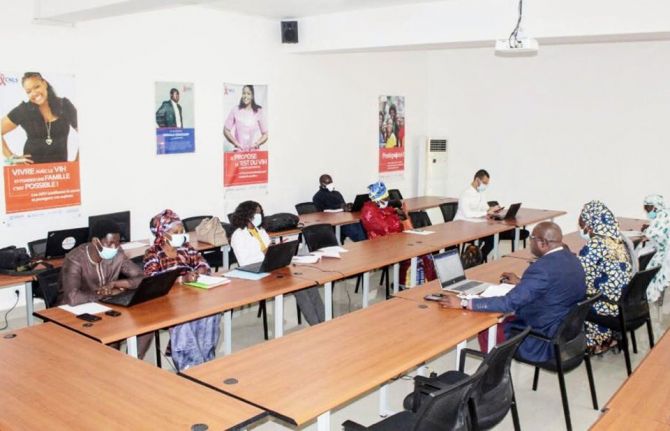

Feature Story
Gender inequalities in Senegal highlighted on Zero Discrimination Day
03 March 2021
03 March 2021 03 March 2021The Network of People Living with HIV in Senegal (RNP+) marked Zero Discrimination Day 2021 by hosting a dialogue on the extent and impacts of the stigma and discrimination faced by women and girls living with HIV in Senegal—a country in which the 2017 People Living with HIV Stigma Index showed one in two people living with HIV experienced stigma and/or discrimination from others.
“Discrimination continues to affect women and girls and this is the reason why they are often excluded from the labour market, are isolated in their communities or experience stigma in health centres. Key populations are also historically the target of discrimination in Senegal,” said Soukèye Ndiaye, the President of RNP+.
Various assessments undertaken in the country have revealed that women living with HIV face obstacles in accessing reproductive health services, that sex workers face high levels of stigma in health-care settings and that the economic and social vulnerability of women living with HIV is not sufficiently taken into account in HIV programmes.
This dialogue served as the spearhead for the advocacy strategy that RNP+ will develop this year on human rights and gender issues in order to better respond to the expectations of its members and communities affected by HIV. This strategy will be accompanied by communication tools such as videos in several local languages and dialogue and sensitization sessions with key actors in the regions most affected by HIV.
During the dialogue, the participants were invited to support the RNP+ in this process. In particular, they were asked to become “champions” committed to making a better use of journalists, community radio and social networks to sensitize the general public to the challenges of discrimination.
Abdoulaye Ka, in charge of human rights issues at the National AIDS Control Council (CNLS), recalled the importance of continued collaboration between the state and non-state sectors. “Community organizations and networks have long been essential in the fight against AIDS because of their central role in raising awareness, informing, dispelling myths and misinformation and providing services to marginalized, vulnerable and discriminated against populations.”
The dialogue, which was supported by UNAIDS, brought together about 30 participants, including people living with HIV, representatives of women’s movements and key populations, human rights advocates, policymakers and health service providers in a meeting held both virtually and physically.
“In Senegal, we know that discrimination against people living with HIV is still a major stumbling block in all aspects of the HIV response. The United Nations Joint Team on AIDS has always placed human rights and gender considerations at the centre of its work and support,” said Demba Kone, the UNAIDS Country Director for Senegal.



